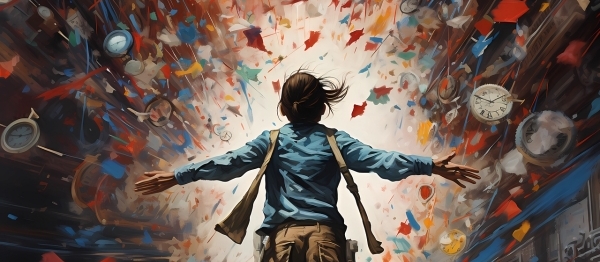He didn’t know how many generations had lived in the house. All he knew was that the man and woman who’d lived there before had died from cancer and that the woman had obviously been an avid flower gardener.

The evidence lay stacked in the old weather-hammered garage above whose rain-darkened roof crepe myrtle rioted as tall as the surrounding dogwoods. Doubtless, the woman had once taken care to prune the luxuriant foliage for which she alone must have had a responsible hand. In fact, the garage held hundreds of clay pots, starter cups for the purple irises, autumn crocuses, and delicate morning glories that sprang up and surprised the all too fretful eye of the present owner.
Yet he was grateful for the woman’s lingering presence, for the well-worn grooves of thought and planting that remained undismayed amid weariness and strife and undiscovered love that scorned easy ways or the clock still ticking in its place. Above all, the woman reminded him that night fell heavily and that love, if it could be found at all, was to be pursued in a shifting dream, in the grass-quivering heat of a summer day that might have been once.
On such a day the present owner stared out his window at a well-fed jay, perched noiselessly in the breathless shadow-green of a redbud and felt a kind of homeless longing even though he was, by all rights and decrees, the present owner, responsible for cutting grass, gathering wood, walking a boundlessly energetic pup in the pre-dawn gloom, and tending to corrosive plumbing, never convenient in its ability to balk at a reasonable hour of the day.
Instead, he could imagine rooms emptied of the voices of children long grown and moved away. And he wanted to tell these phantom children that he’d had no way of knowing the seeds they’d all been planting, and that it was damned near impossible to understand anything in the act of doing it. That always seemed to come later when it was too late.
And he remembered how he’d always taken it for granted, somehow, that he would exist innocent and undisturbed in his parents’ presence, even though he could sense his own changing, even welcomed it. But there’d come a day in the house where he and they had grown to change, passing like shadows toward evening (though the clock still ticked in its place), when he’d realized that voices, once familiar, faded and died and remained, at once, undismayed.
The child forever stole over him after that and he tried to catch a glimpse of one of the honest spirits he’d once loved, who’d grown up in flesh around him only to be quietly put to rest. He sometimes liked to think they’d been charmed out of life, and he could almost see them at times, usually when he was glutted with endless lives thwarted by an insane riddle, begging him to come away and leave the earth. And he wondered if death wasn’t like stepping into the sunshine.
But the present owner also understood something of duty. Nor was he so foolish as to believe his present life was entirely without joy. In point of fact, his children with their posters of sports heroes and exotic beer can collections still occupied rooms at opposite ends of the hall downstairs. With little difficulty he could see his wife’s figure sitting at the piano, hear perpetual music in her voice.
But what made his heart run away with him at times (he even imagined nagging little chest pains, or did he?) was an inability to knit together his past and present lives. He failed to know where one generation ended, another began. Add to that the fact that his children weren’t really his own, were and weren’t, but were part of a patchwork effort by the present owner and his wife to bring together two families, and the likelihood of anybody understanding anything of a continuity of feeling was all but lost.
Still, the present owner understood, even anticipated with horror, one incontrovertible certainty: that of seeing his mistakes in the lives of the children. That was the definition of original sin, the consequences of which knitted them all tragically together. The introduction of each’s life unto the other’s insured that.
But, for the time being, there was this place, and it was not without an often drowsily perceived joy of which memories are made. And rather than kneel and weep, the present owner was inclined to participate with his wife in mutual worries, the outcome of which neither could foresee in the act of worrying.

Sometimes the present owner worried about dying, nor was he wholly unaware of the futility of such a gesture. It was simply that he didn’t want to leave anything undone. He wanted his wife to possess things no memory could forget; he wanted the children to understand all his cursings and kisses and rousings from the cold sweat of a peculiar hour. Above all, he wanted them to know he hadn’t betrayed them by dying, by withholding part of himself in darkness from them, begging the sudden interruption of light, radiant as the face of God laughing through eternity, come to dispatch him from all his brooding works and loathing for life which they, neither unfaithful nor unkind, could understand. It was this exquisite treason that he tried to conceal from them, wishing desperately that he could provide an anodyne for the half-wakeful moments when forgotten days would rush back like the salt-sniff of the ocean echoing years. The very cowardliness of such a wish made the man’s eyes shrink before the faces that, more often than not, bore his pain mercifully concealed.
At such moments, the man usually heard the clock ticking in its place, swore oath to a vision no one could see, and fortified himself with mysterious rejoicing that he was, after all, caretaker and the present owner.
There was solace in that which was more than affordable. Besides, there was the challenge of dignity in awaiting the patient moment when a throatless song would rise to lips cold as ashes. Until then, the man who still possessed a rich shock of hair was content to make a life’s work of sitting in his attic office, searching the rafters for a blueprint not of the house exactly, but of the ways in which several lives could be discovered and sung to completion in such a house.
It was never the result of willing, but always of unespied growth. Nothing was wasted either: not the dewy webs shimmering like coronets at a child’s touch, nor paths worn smooth by vulgar resistance (aloof from all distress), neither one of countless storms of leaves billowed casually, directionlessly, toward the most durable of fates: neglect. None of it was wasted, none accident. Indeed, one of the few galvanized certainties to which the man attached himself was that nothing was accidental. Not even an undismayed eye failing at first to spot a ragged envelope in the airless, winded portion of the attic where children once crouched knobby-kneed, listening to a clock ticking through a register below, waiting to secure release from an endless afternoon of hide-and-seek and other, undiscovered ways.
Upon picking up the envelope engraved in dust, the present owner tucked the phantom children out of sight once more. He would elicit their drowsy charms countless times afterwards. But now he held in his palm evidence of a blueprint. Perhaps he could decipher the scrawled contents of lives once, twice removed from his own.
He paused tentatively, framing the corners with a thumb. In an instant he could gain access to an unbidden portion of their lives. Like an observer hurtled through years, he could stand at the window, looking in. It was an enviable perspective but was it fair?
He was suddenly struck by the absurdity of the question. For parity was achieved only in death, or as one philosopher had put it, “No man is enviable.” Thus, the present owner was doing nothing shameful; he was simply trying hard not to misread the complex instructions of a life he desperately wished to live in earnest. Who could predict such matters or fail to say that a truant gaze might not one day fall upon some words of his own strangely unfamiliar, robbed of context? Imagine the fragments of one’s story being reconstructed as a kind of anthropological puzzle. Circumstantial evidence here, a falsely drawn premise there, and one was suddenly lodged in the minds of strangers pursuing an itch for truth as silent as a stone.

Even the face of the land changed constantly so that should one of the previous owners be resurrected at that moment, he would find little of the warmth and light he’d drawn up through the soles of his feet, holding him fast to the circling path of stars breathless beyond turmoil. Not even sorrow would suffice for a landmark anymore.
Despite the present owner’s sympathy for the now homeless wraiths, fiercely clinging to a spot no one dared call his own, the man of the house parted the jagged mouth of the envelope only to discover hollow parchment whose corners had been nibbled up by the light. The contents had been entrusted to silence.
Strangely, the present owner was relieved to find the envelope emptied of consent. He did not wish to replevy that in which he’d had no hand in sharing. It was enough to imagine what had probably been an after-thought discarded long ago.
The envelope itself lent evidence to that assumption. One of the corners had been submitted to filigreed calculations casually recorded in ink of a different color from that found on the face of the envelope. Decimals indicated further that someone had been preoccupied with money, a checking account perhaps. But there was a wrinkle in such thinking which the present owner immediately acknowledged.
A blur of spokes tugged his attention to the road where each afternoon children sped on bicycles, pedaling on air, mouths full of laughter. Twilit hours threatened to quench an overwhelming mirth—that, and the cumbersome responsibility of bags slung over shoulders and choked with newspapers. Delving deep into such a bag, the present owner squeezed a tightly scrolled account of the day’s events in his hand and wondered if the recipient of the letter might not have been a child—no, not a child since children were not yet sworn to a conspiracy of silence that demanded letters read privately, then quickly dispatched from view. The present owner himself had once received such a letter. It was from a girl ripe in the early season of ways he did not entirely understand. She’d tried to mix something of dreams and the earth in her fingers as she’d written, pointing to tears on a burning bed, scribbling of desire that took shape before her eyes and assumed the name and face of the present owner. She’d sacrificed herself to him on a perfume-scented page. But his mother had intercepted their correspondence and proclaimed it pornographic.
Had the recipient of the present letter disposed of the contents rather than have his dream mocked and mutilated, then served up for consumption by those whose appetite demanded compensation for all the lean and slackened years of desire? The present owner studied the precise calligraphy. Someone had written a letter to a Jimmy Archer (unknown) of the present address and mailed the letter at 9 p.m. on August 10, 1950. The present owner was relieved to know that love had existed then, too. The postmark bore it out. Wavy lines remained stamped over Thomas Jefferson’s three-cent likeness.

On the rear flap of the envelop the owner found a second name embossed in printer’s ink as was fashionable at the time. It read: Phyllis Hitchens: 737 Haws Avenue; Norristown, Pennsylvania. Who was Phyllis Hitchens? Why had she mailed a letter to Jimmy Archer over so long a distance? Had she sat that morning staring out the window at a noiseless jay while anticipating miles of delivery? Did the letter go unanswered? Or was the present owner trying to locate something, someone that didn’t exist?
He gasped with the realization of how that had been thirty-four years ago. Even his own memories did not go back that far. He had to depend upon still-life recollections stuffed in shoe boxes for that. The present owner even wondered if his first memories of himself weren’t actually memories of photographs of himself. There was the frozen likeness (or was it unlikeness) of himself and his mother standing adjacent a tulip bed in the side yard. He was barely a toddler, she a self-consciously fashionable and nervous woman with one shoulder cocked lower than the other to accommodate the difference in their sizes. Did the present owner really remember holding her hand and posing there on such a day? He thought he did. He also thought he remembered clover and the ground buzzing underfoot with June bugs. But that was six years after someone named Phyllis Hitchens mailed her thoughts to someone named Jimmy Archer, submitting the sealed contents of all she cherished to the unknown terrors of time and distance. Had they managed to overcome these obstacles, marry, raise children? Did Jimmy Archer, assuming he was alive, ever think about Phyllis or the house in which he’d once lived and played and misplaced an envelope one afternoon as darkness was growing outside his window?
What would Jimmy Archer think now with a stranger’s furnishings replacing his own faded but familiar, flower-splashed couch? Could he still find the pencil-winged insect he’d drawn on the wall of the alcove upstairs?
The present owner tried to imagine all who’d made their lives here. He wondered if the light slanted now at precisely the same angle as it did in 1950, or before. Assuming he could locate them, he would like to invite the previous owners in to view the place, to recreate all they’d become there without knowing it, or knowing it only too late. The closest the present owner had come to fulfilling such a wish was the time the daughter of the woman next door had come to paste up wallpaper. She’d worked quickly, efficiently, despite the present owner’s questions.
“No,” she answered, “the house didn’t look like this when I was growing up next door. But then, I haven’t been in this house for years.”
The woman’s eyes had flashed in remembrance of some part of the house all her own.
“When we were little girls, we used to play upstairs.”
Now the present owner gave pause to cup the woman’s echoing words to his ear. The house didn’t look like this, she’d said; nor would it probably look this way again. After all, the present owner would most likely not be the last. Life crowded out each generation so that it was just possible that every place on earth would be occupied by somebody else. People would be left to discover one another’s envelopes for centuries. The thought heartened him.
As for now, he was content to exchange faces with his neighbors, one of whom just yesterday was splashing paint on his porch undismayed. Nearby, a dog had tested its leash.

The present owner stared up at a luminous dial that tocked Big Ben on the quarter hour and rose. He descended the attic stairs and waded into a splash of sunlight, an almost hingeless screen door banging shut behind him. He made a mental note that the grass needed cutting at his earliest convenience. To his delight, a waning impatiens plant had rejuvenated in the cool morning temperatures. Ageratum floated just above the ground.
The man strode to the edge of the driveway. Someone was making repairs or building onto a house in the hammer-clacking distance. He paused, listening to a discernable rhythm in the work. Then he stared at the familiar line of houses across the street before reaching out to open the paint-flaked box worn numberless by the years. Fingers trembled in anticipation of stuffed contents: clean envelopes and glossy magazines labeled with precise postmarks and all addressed mercifully to the present owner.
The above work by Edward Francisco was originally published in Wind Literary Journal, 1988.
**Featured image: Photo Mix from Pixabay
